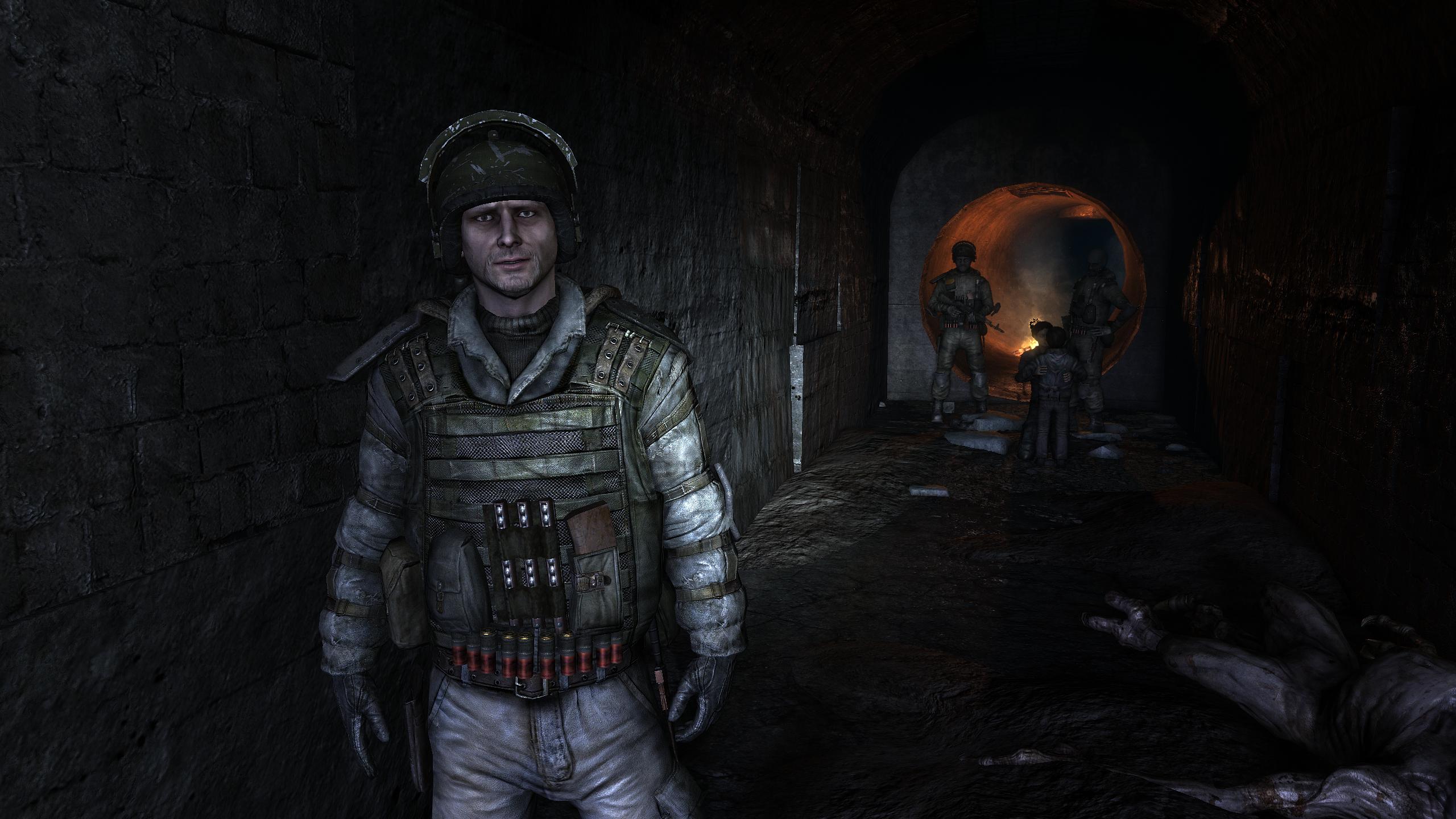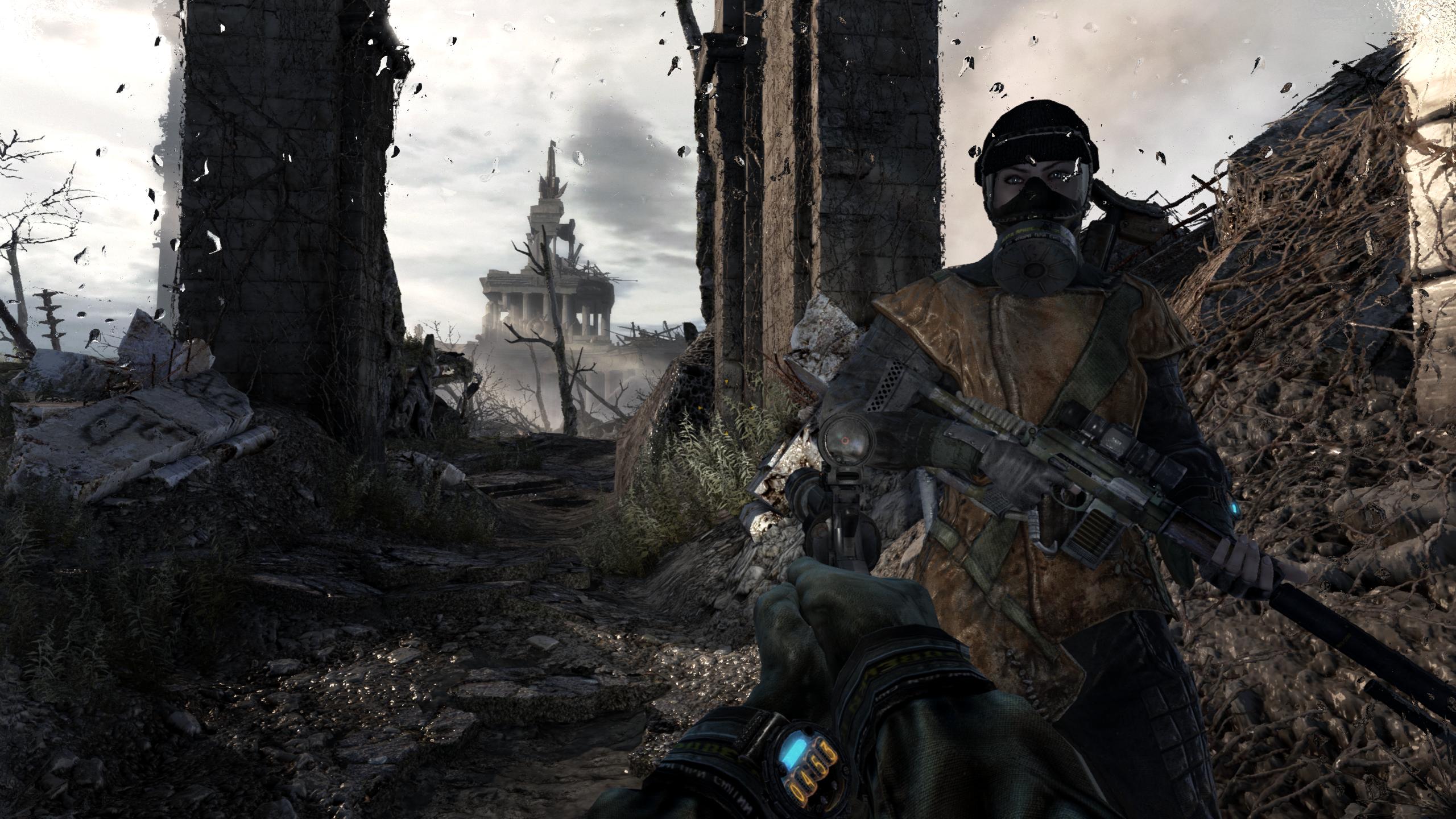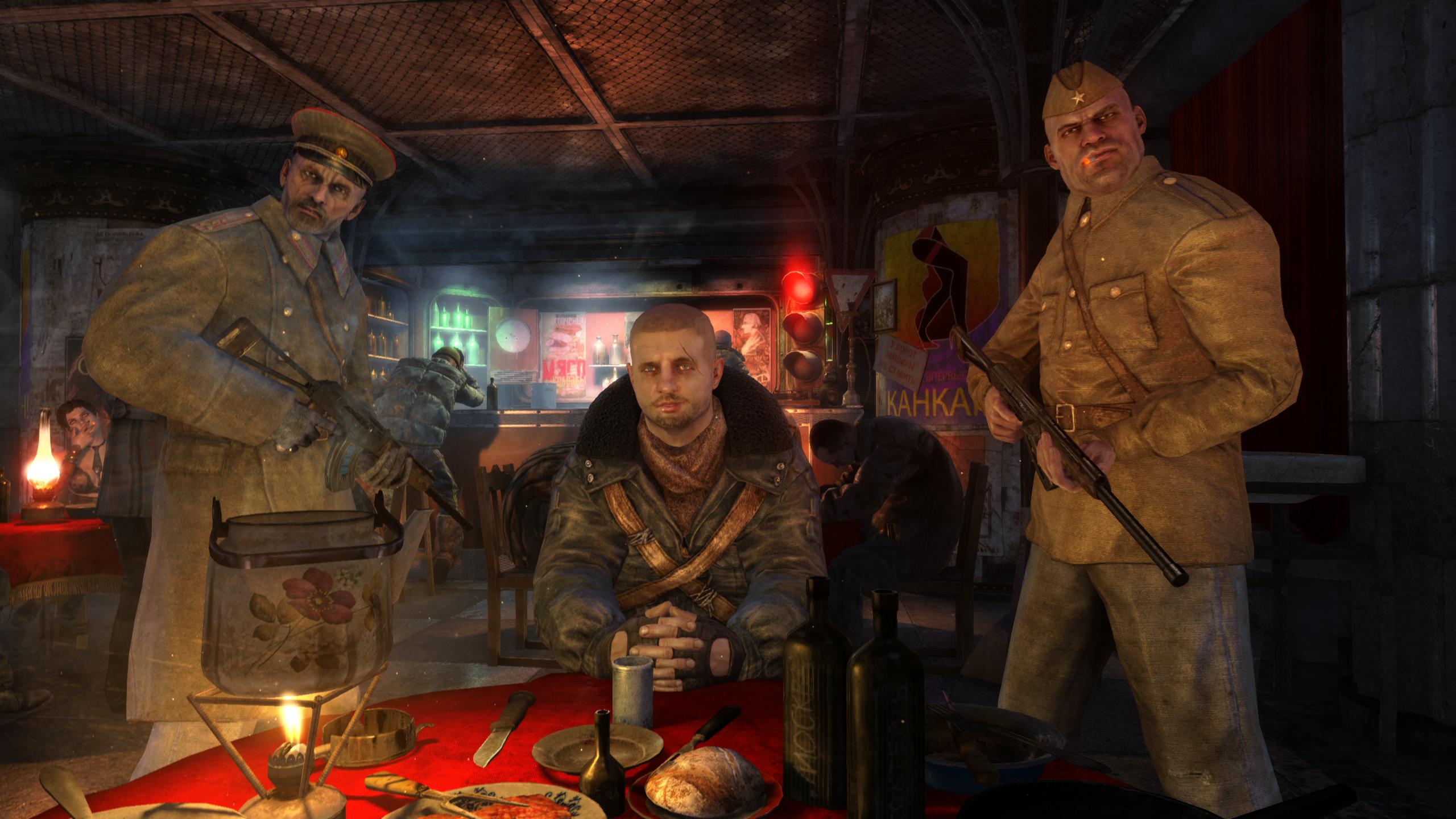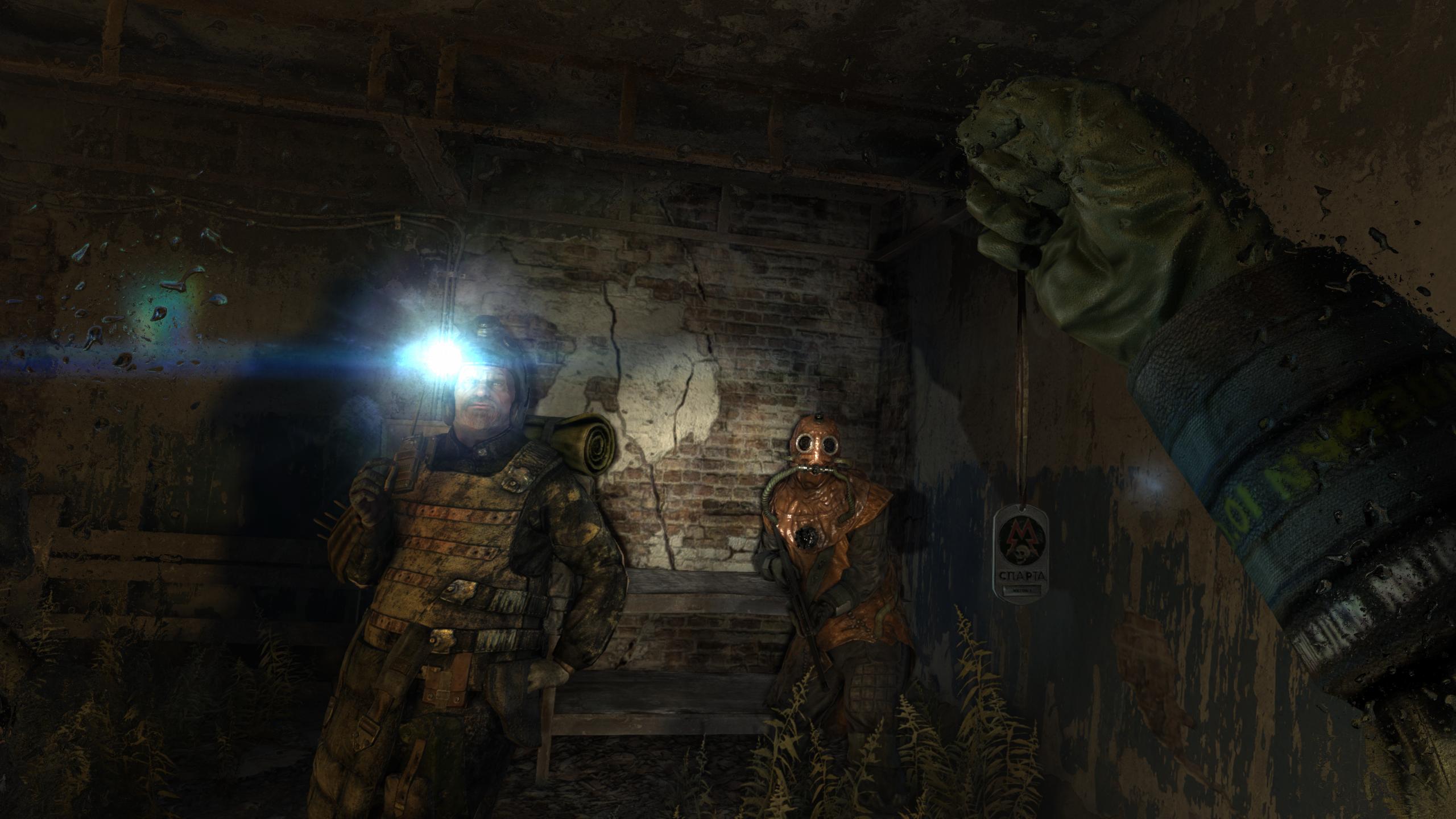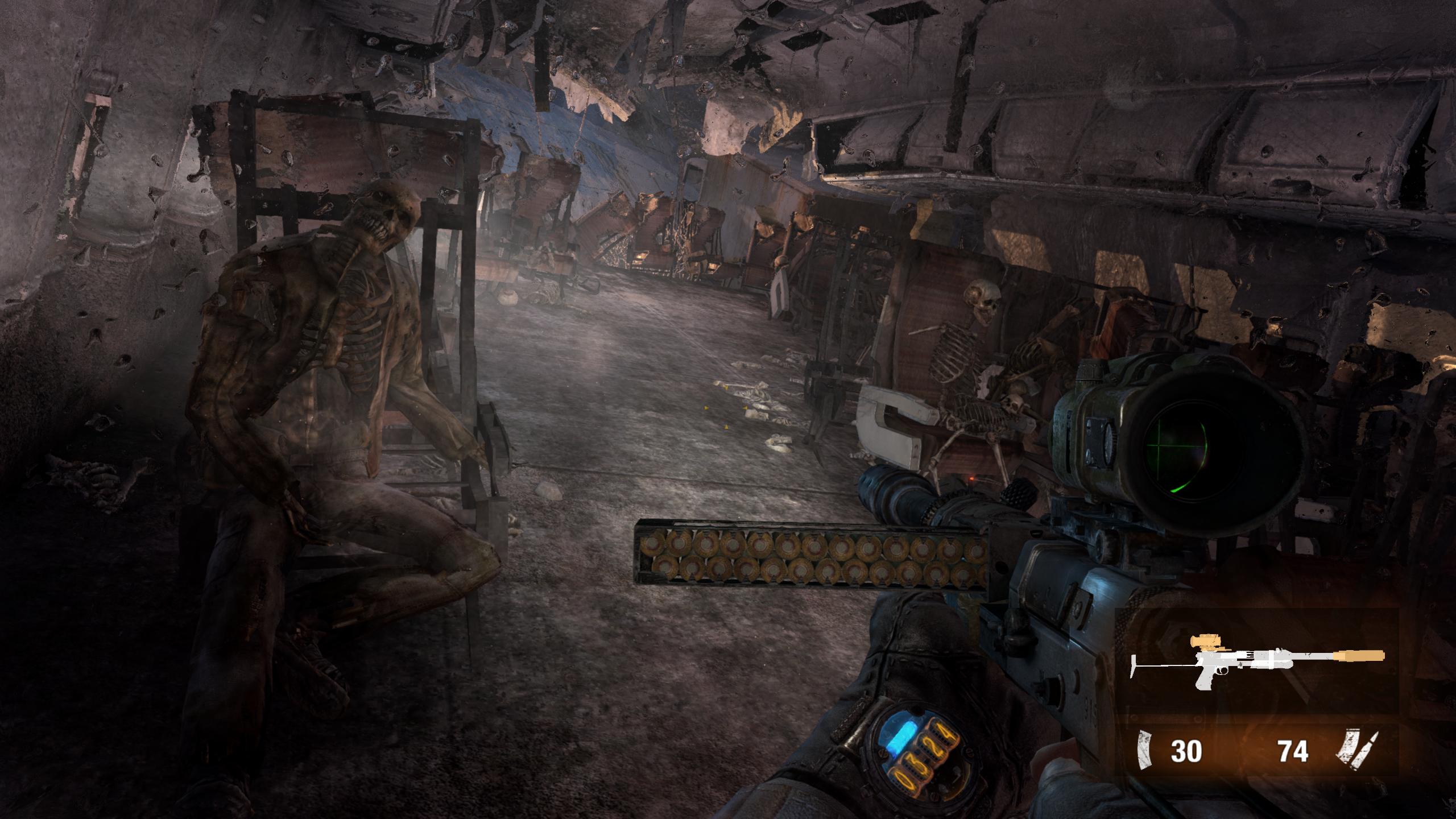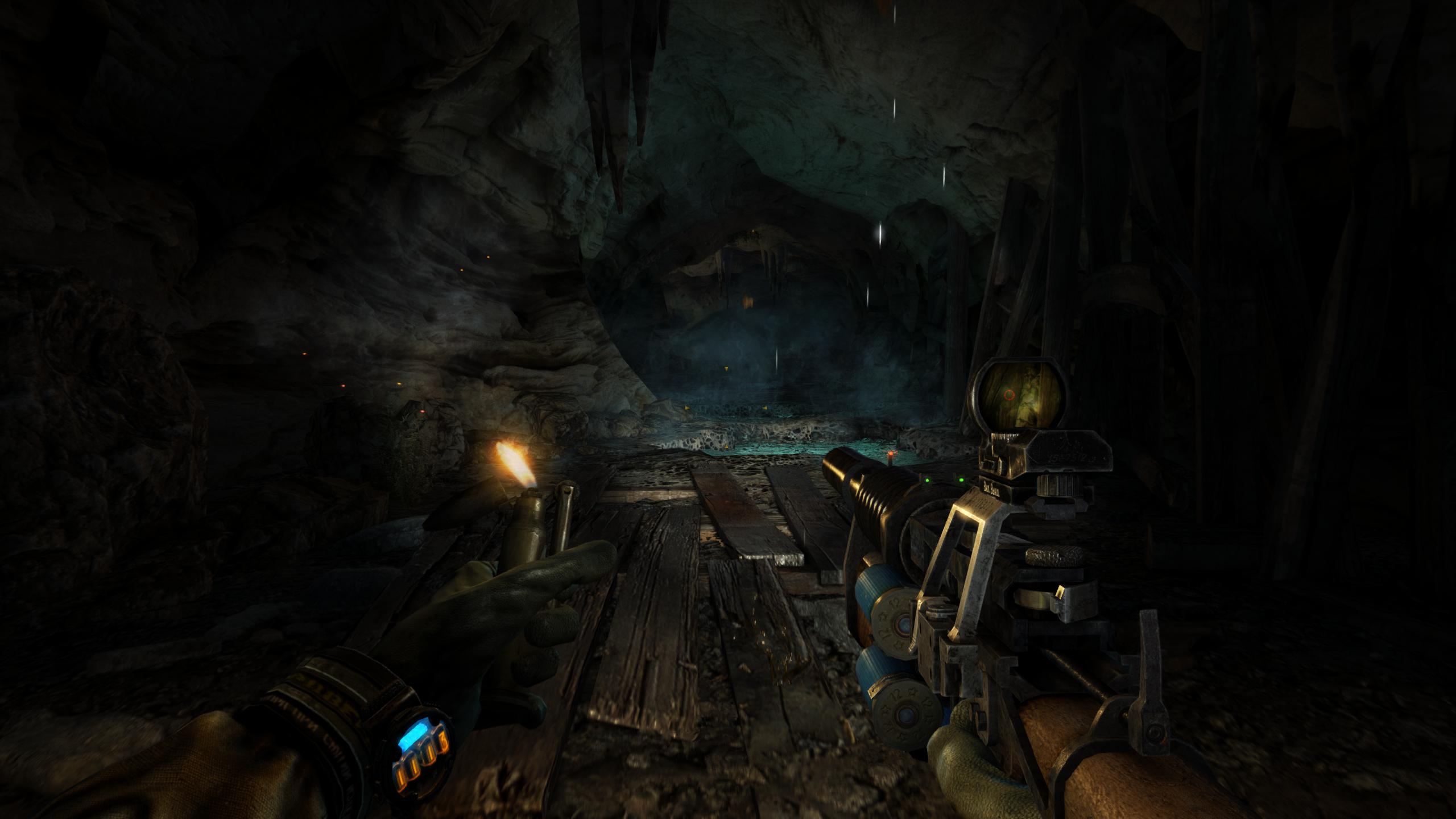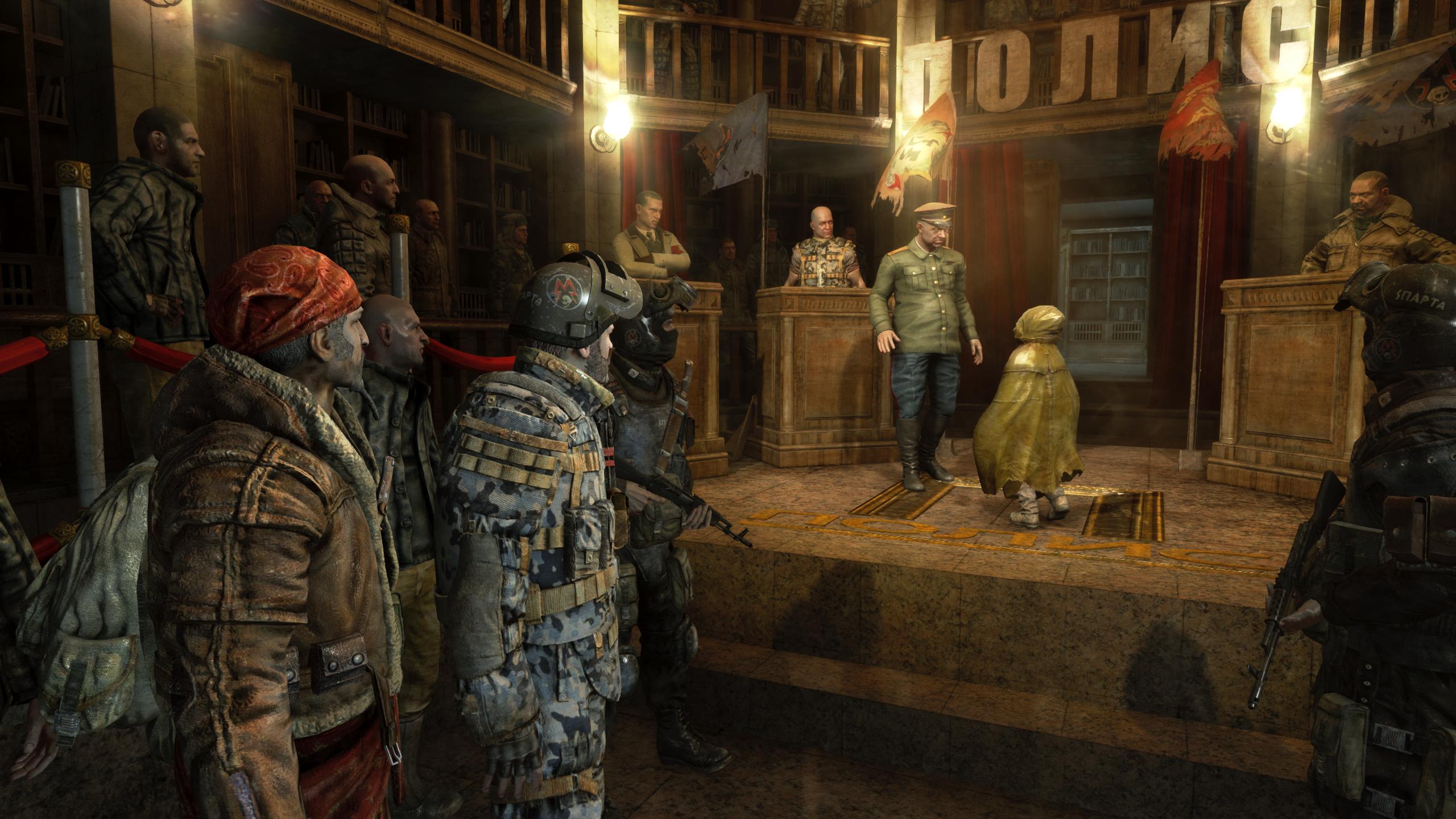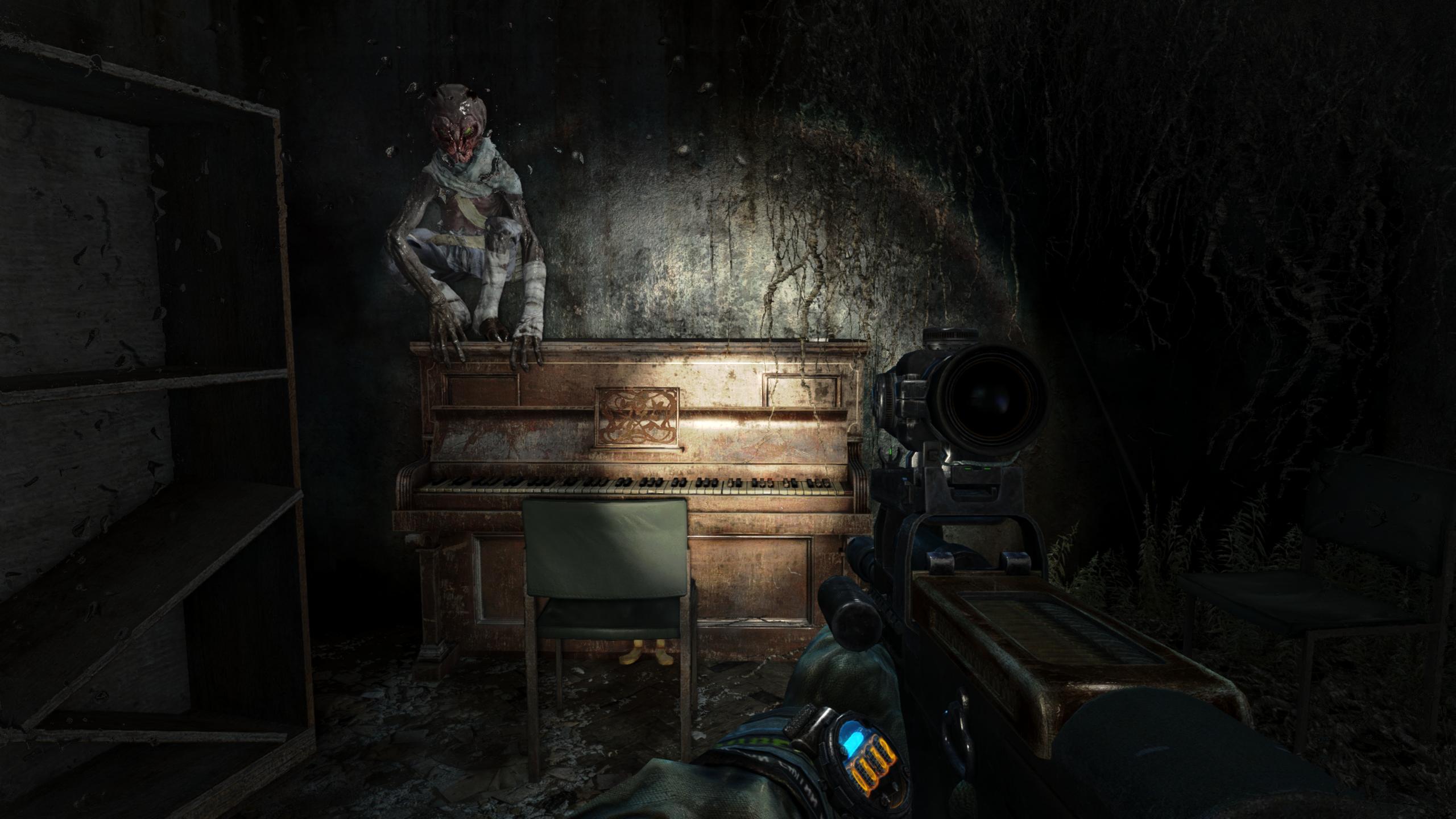Metro 2033 and Metro: Last Light
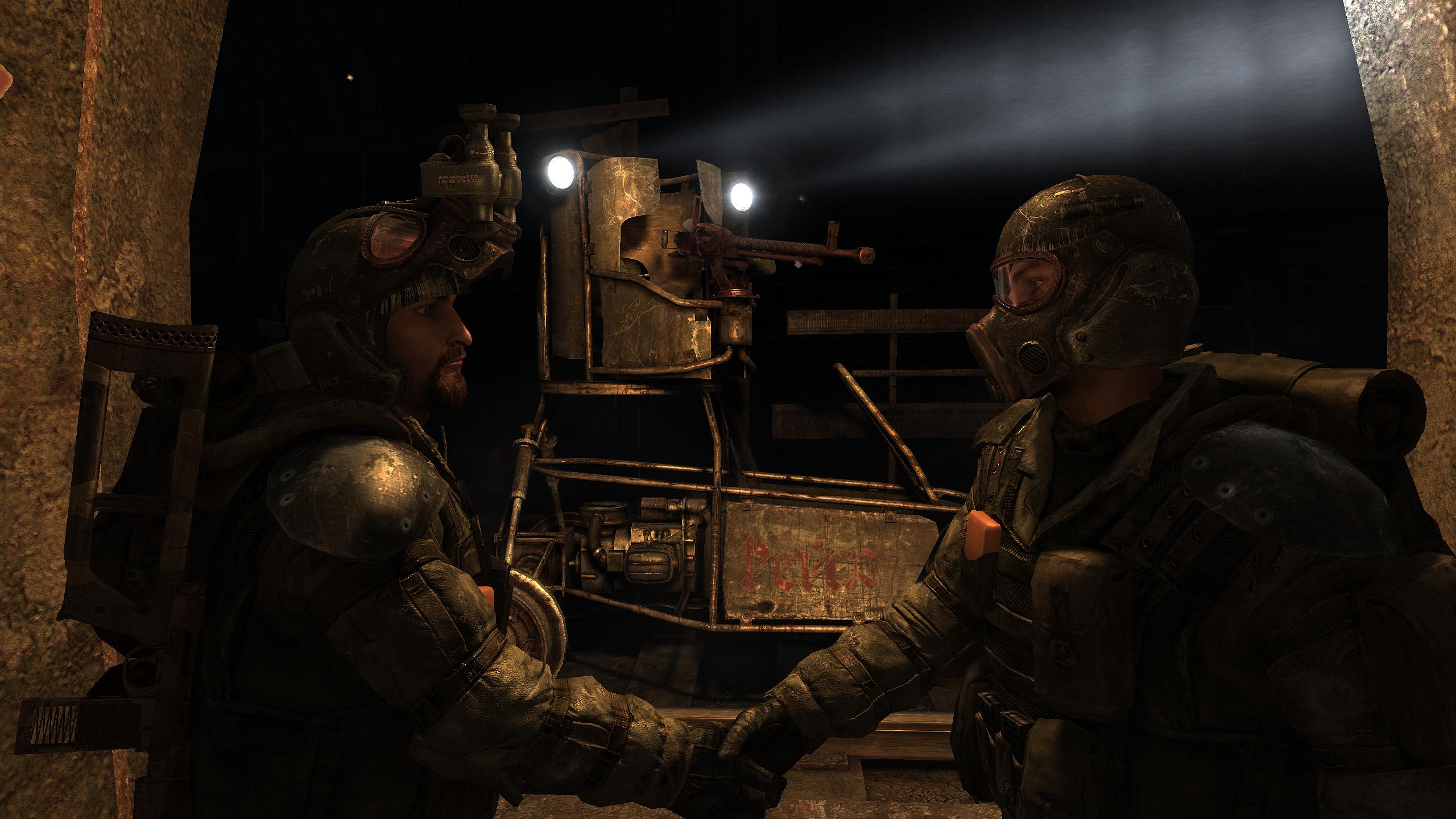
At the heart of it, Metro 2033 is about camaraderie. You’re not a Ranger, but friends help out friends.
I think I restarted the original Metro game probably five or six times. It wasn’t because I wasn’t very good at it, or that I didn’t enjoy it, but every time I’d get up to one part, but then I’d run out of filters and die in the harsh environment of the post-war Moscow. Or I’d come up against innumerable enemies, waste all my ammunition, and die. Or maybe I’d lose my way, frantically run around trying to find the next area to go to, run out of filters, and die unceremoniously in some dark corner, panting for breath as everything slowly faded to black.
I probably played through the first few chapters five, maybe six times, each time growing more and more frustrated with a game everyone was raving about, all because of its incredibly atmospheric gameplay and fantastic plot — an atmosphere and plot I was being denied time and time again, due to my own inability to survive on the irradiated surface.
It even got to the stage where I wanted to play through the game so badly, wanted to experience it for myself, that I looked up cheats for “infinite ammo”, or some kind of god-mode invincibility so I wouldn’t have to worry about using my hard-earned military-grade rounds buying filters for my mask whenever I got the chance. I’m usually against cheats, but in this case I was making an exception. I was desperate to play the game, but it seemed as if the game didn’t want to be played. At least, not by me.
So I played other games. Every time Metro 2033 came up in a Steam sale, I pushed away the guilt of never having played what was by all accounts a fantastic game, ashamed I couldn’t even beat it on the easiest difficulty. My pile of shame grew, but Metro 2033 sat squarely on the top of the pile.
It wasn’t until Metro: Last Light came out that I read a review of Last Light that said the first game was supposed to be played as a stealth shooter. Then it dawned on me almost as if I had just stepped out of the underground tunnels of the metro and into the harsh sunlight above ground: that was exactly what I had been doing wrong all along. Instead of sneaking around in the shadows, crouch-running through the tunnels, I had been going in all-guns blazing. Instead of conserving my ammo, I had been neglecting my knife when only one or two enemies were between me and my goal.
Looking back at it now, I’m reasonably surprised I didn’t think of playing 2033 as a stealth game. I must have restarted the game some five or six times without changing my play style, each time expecting to Rambo through sections with wanton abandon and then dying out in the unforgiving tunnels and surface. But after learning about playing it as a stealth game, everything changed. Suddenly, I had more filters than I knew what to do with. My knife became my best friend for dealing with one or two bad guys, and ammo, while not exactly abundant, became plentiful enough.
The game changed.
Instead of a game where my every thought was on survival and finding enough filters, it became a game about exploration and discovery. Fear was replaced by a curiosity that could only be sated by exploring every nook and cranny for supplies, with little fear about how many filters I had or which direction I was going — although that could also be attributed to my compass, which always lead the way to the next objective, to the next rendezvous.
Sections that had seemed impassable before due to the numbers of enemies between myself and my object now seemed easier, somehow, either by use of stealth or a little ingenuity on my part. The game didn’t become any easier, necessarily, but the simple act of playing it differently meant that I could see and explore places I wouldn’t have had the chance to had I just sprinted through rooms filled with enemies.
I started to enjoy the game.
And what a game it was. The reviewers and critics were right: Metro 2033 was as deserving of every accolade it earned, and for good reason. As an introduction into the subterranean life of a post-nuclear-war Russia, it was unparalleled. As a look into the life of one individual’s journey through the dark tunnels of the Metro, the harsh wasteland of the surface, and deep behind enemy lines, it was an awe-inspiring experience.
Forging your own path was easier if you shot out all the lights first so that you could remain unseen, as indicated by your handy watch. Stealthily taking down enemies wherever possible meant you raised the least amount of suspicion, meaning a longer time undisturbed looking for ammo, military-grade rounds, or secret caches filled to the brim with ammo, filters, and military-grade rounds.
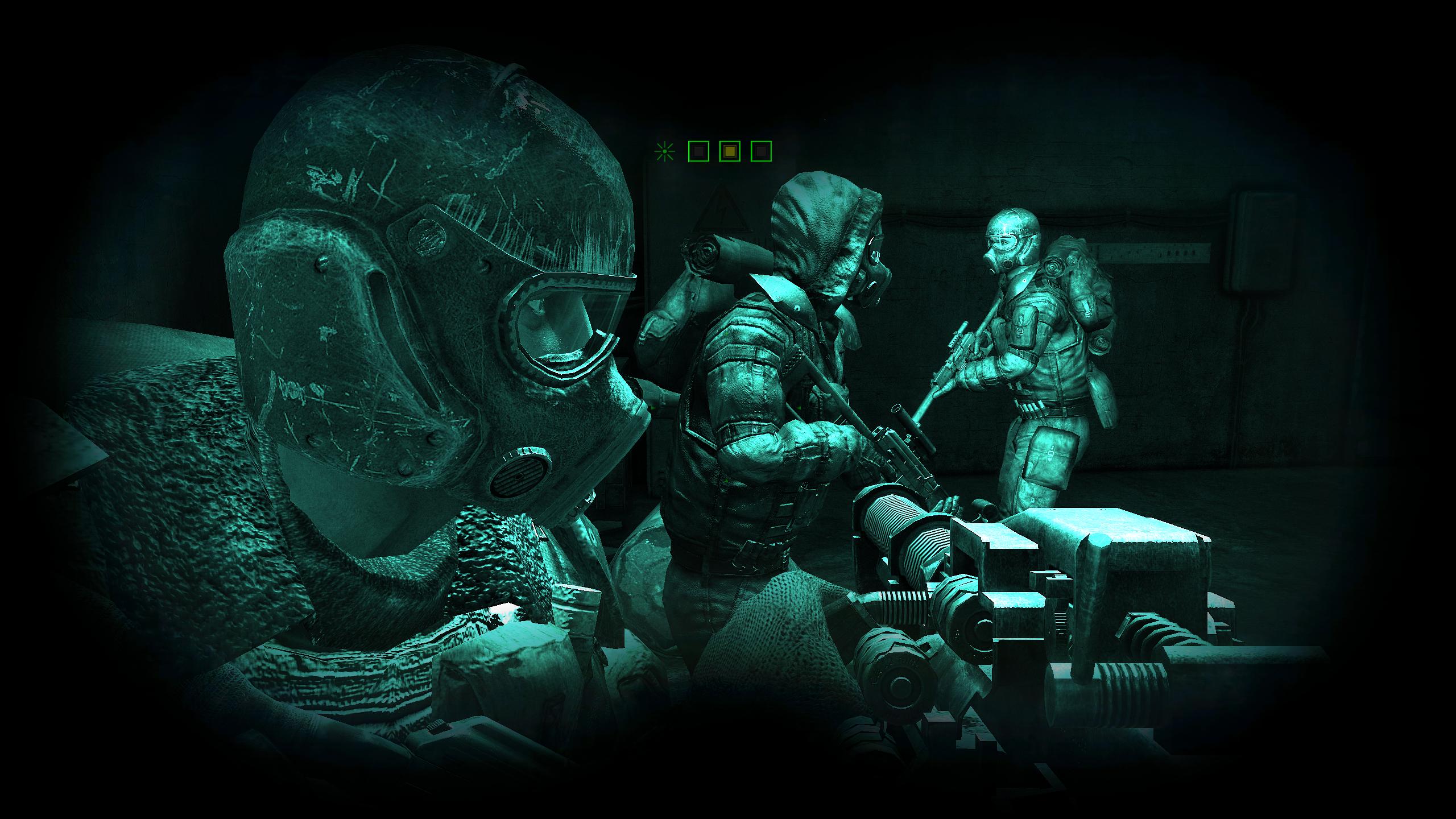
“Does this helmet kind of remind you the NCR Ranger Combat Armour from Fallout 3, or is it just me?”
But as much as you thought you were the silent killer lurking in the shadows, you never felt overpowered compared to the enemies you encountered — human or otherwise. Part of the reason you had to sneak around in the first place is because you’d quickly run out of ammo if you had to engage the enemy, particularly during the section where you’re between two sets of enemies on either side, where you have to jump around and avoid being spotted. The only time you feel on top of things is when you’re journeying towards the D6 compound with your fellow Rangers — only because there’s safety in numbers, and even then, only when those numbers are comprised of the Ranger elite.
In terms of gameplay, Metro 2033 is a shining example of how to do stealth right. There’s parts where stealth benefits you greatly, combined with parts where you can’t stealth due to environmental conditions, and just have to run and gun. Your watch helps you immensely, and paying attention to it is usually the difference between a successful stealth attempt and tens of soldiers being alerted to your presence and opening fire.
The plot of Metro 2033 isn’t too bad either. You meet a couple people and do a few things along the way. You’re never completely alone except for a few short parts here and there, and you always have a clear sense of purpose, even when you’re given the freedom to roam around an underground establishment or and above-ground environment.
For the most part, other characters will be there to guide you through various sections. It’s a little hand-holdy at times, but means you’re never really thrown into a situation you can’t handle. I usually hate escort missions, but this isn’t like that at all — if anything, it’s more like a reverse escort mission where you’re the one being escorted through the bowels of post-nuclear-war Moscow, being taught survival tips and tricks along the way. If another character tells you to jump, you don’t even have to ask how high, because he’ll tell you.
The introduction at the start of the Metro 2033 is brilliantly executed — the whole “play through this first part, then flashback to the beginning of your journey, playing though until you come back to this section again” aspect is a plot device more frequently used in TV, but it still works here. It creates enough intrigue to get you hooked and just enough action to blow you away, at which point it dials it all back a few notches so you can start to ask questions and get truly into the plot and story that Metro 2033 presents during the course of gameplay.
Make no mistake: Metro 2033 is a great game.
Which brings us to the recently-released sequel, Metro: Last Light.
For the most part, Last Light follows in the same footsteps as its predecessor. It’s more of the same thing — a good thing, seeing as the original was nothing short of superb. The plot picks up straight where 2033 left off, after you killed some folks who weren’t really a threat after all. An old friend kicks things off by saying there might be one last survivor, and that you have to find him and talk things over; why you killed his family, that sort of light conversation.
And so your journey begins. As the story unfolds you’ll discover a nasty plot involving an opposing faction and deception from every side of the fence: you’re captured early on, and that lends itself nicely to your escape. It isn’t until you’re reunited with your Spartan brethren that you feel truly at home and with a purpose and a plan, but then just when you feel like you’re among comrades, things are snatched away from you once again.
Last Light has fewer of the reverse-escort missions from the original game, and you’ll comparatively spend a lot more time alone. People on the same team as you show up every now and again, but only to point you in the right direction. There’s one part in Last Light where you meet a guy for all of literally 30 seconds. He shows up just as the bad guy gets away, tells you to put on some clothes, points you in the right direction, and is gone. That’s literally all the interaction you have with him, and then he’s gone.
Let’s face it: no one like being alone. Being alone sucks. Whether you’re out in the open on the surface or making steady progress through tunnels, being alone sucks. And in Metro, being alone might as well be a death sentence. There’s no one to watch your back, no one to make casual conversation with, no one to guide you through whatever hell you’re about to experience first-hand.
Over the course of your journey through the Metro and the above ground, you’ll run into various people. They all might have their own agendas, but you’ll be glad for their companionship as long as it lasts. You’ll walk though a crashed passenger plane together. You’ll fight off the Watchmen together, before making it to safety. You’ll hunt for the Dark One together, and, a little later on, you’ll look for the Dark One together. You’ll be glad for their companionship and camaraderie, because soon enough, you’l be all alone once more. The times that you do meet up with people, you meet as equals with a shared purpose, instead of leader and follower as in the previous game.
But you know what? Being alone isn’t so bad. I mean, you’ve always got your trusty weapons (provided you haven’t run out of ammo), and your trusty clipboard and lighter tells you where to go and burns cobwebs out of your way for you, respectively. With your weapons, clipboard, lighter, and oh, let’s not forget your flashlight and gas mask, you’ll journey through all kinds of subterranean tunnels and caves, fighting off Watchmen, the spiders that are afraid of the light, and those damned irradiated shrimps everywhere you go. Sounds like fun, right? Since you’re now a Spartan Ranger, you’re expected to handle yourself, regardless of what horrors the Metro throws at you.
OK, I lied: being alone sucks.
But only because the Metro series, which doesn’t set out to be an outright horror title, actually accomplishes the task of scaring people pretty well. It’s genuinely creepy at times, and it’s probably no coincidence that most of those times are when you’re alone and in the dark. For all their differences, Metro 2033 and Metro Last Light approached horror differently: 2033 had those ethereal sequences which blurred the line between what was real and what was not, where you had the choice of moving towards or away from the Dark Ones. They weren’t “scary” as such, but they were certainly unnerving.
Metro Last Light takes it to a whole new level, as anyone who’s played the introduction will tell you. First you’re killing what you think are Watchmen only to realise that they’re your fellow men — as you look down at your blood stained hands, you realise what you’ve done. And that’s just the start of it: Last Light introduces these “visions”, which are like flashes of reality overlaid on top of the real scene. The first time you encounter one of these visions is in the crashed passenger plane, and they’re disorienting at best as you try and work out what’s real and what’s not. Later on, Last Light kicks it up a notch as you’re exploring an abandoned city. Pretty much every room has one of these visions, and when there aren’t visions, there are strange noises: a child crying, inaudible whispers, scratches, screams, that kind of thing. I lost count how many chills I experienced during that level. And we haven’t even talked about the shadows that appear just outside your flashlight’s main cone of light, or the footsteps you hear every now and again.
Like I said: the Metro series doesn’t set out to be a horror title per se, but it still manages to put you on edge.
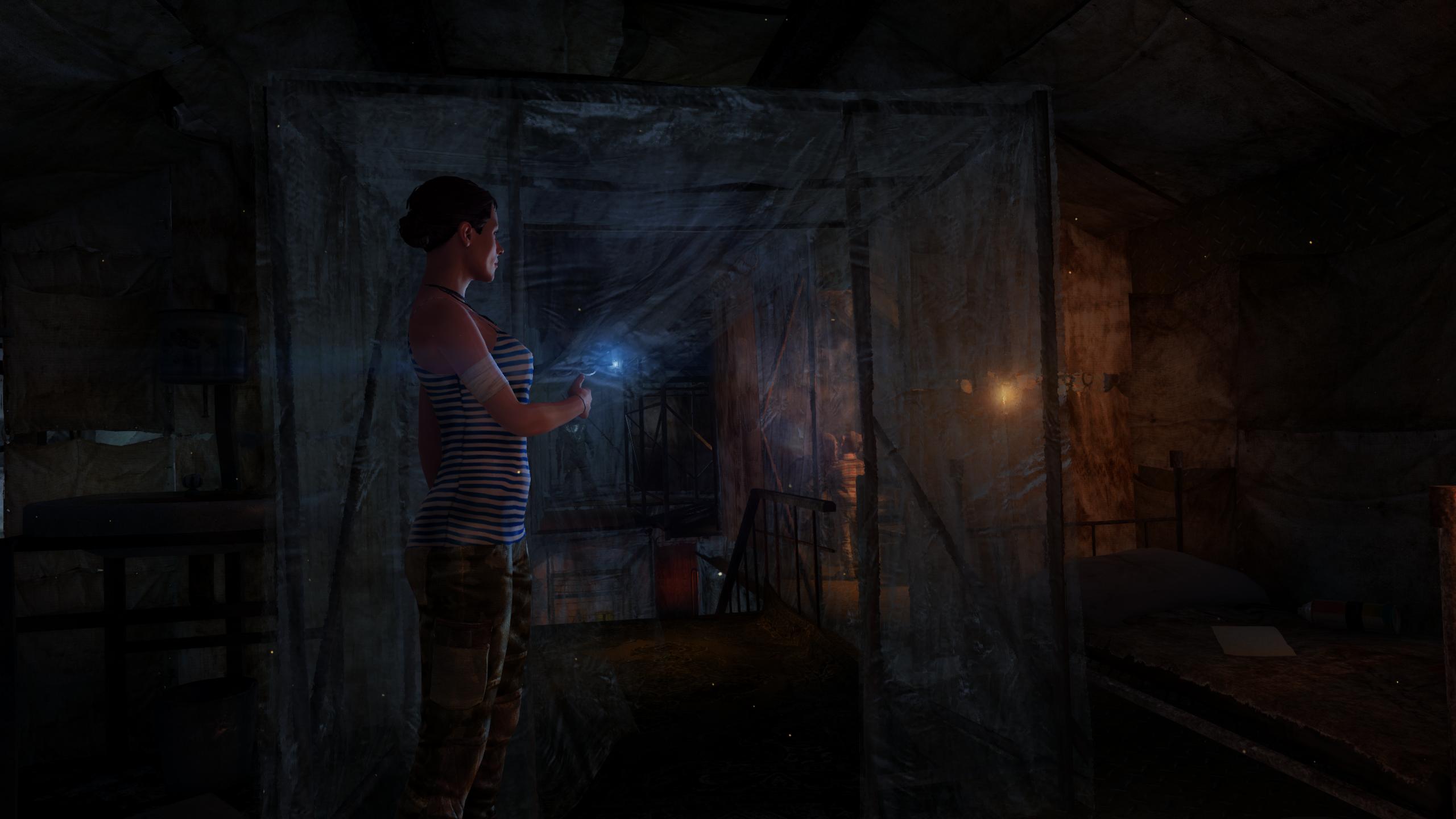
Last Light takes on a new relationship side-story aspect that is different to what the original offered in this regard, i.e. nothing
Compared to the original, there’s a few things I don’t like about Last Light. The stealth is perhaps a little too easy, with enemies unable to see you unless you’re right in their face. And as much as I hate to say it, Last Light seems to have had the dumbing-down console treatment to some degree: during any stealth sections, there are always these panels which turn off the lights: a little too convenient, if you ask me. The same jarring tone is always used for when an enemy notices you, and instead of three visibility levels, there’s now only two. I’m not saying it’s been outright “console-ified”, but it certainly shows elements of it at times.
If there was one thing I could add to the Metro series, it would be the ability to free-roam the world in between the main story line. As it stands, Metro is kind of a linear Fallout — there aren’t quests per se and you can’t have actual conversations with NPCs, but you get the post-apocalyptic setting, the pseudo-horror elements, and so on.
Either way, though, it’s still a truly great game. Play it if you haven’t already, otherwise you’re missing out on the best that post-war Moscow has to offer.
